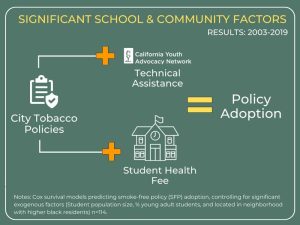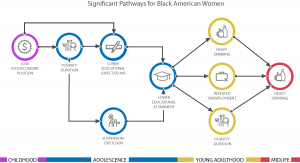Press Release: A new study estimates that over their lifetime, more than a third of U.S. adults or 113 million people are harmed from someone else’s drinking while 46 million experience harms from someone’s else’s drug use. Among study respondents, 34.2% experienced secondhand harms from alcohol, 5.5% from cannabis, 7.6% from opioids, and 8.3% from other drugs. The study, conducted by the Alcohol Research Group, a program of the Public Health Institute, in collaboration with RTI … [Read more...]
New Findings
A major component of ARG’s activities is centered on epidemiology of drinking patterns, which we study in depth, and how these and many other factors, both individual, especially gender, racial/ethnic, sexual minority, and socioeconomic disparities, and environmental, such as neighborhood disadvantage and state and local policies, affect alcohol-related problems. These problems include alcohol use disorders and associated social and health harms such as, for example, injuries, drinking driving, work, legal, health and family or relationship difficulties, various co-morbidities such as mental health and other drug use, and alcohol-related mortality. In addition we strive always to improve measurement, data collection and analytic methodologies.
Closing Bars Early Reduced Homicides by 40% in One US Neighborhood
Reducing the hours bars and taverns could sell alcohol in a Baltimore neighborhood reduced all violent crime in the area annually by 23 percent, a study has found. Research by the Boston University School of Public Health (BUSPH) and the Alcohol Research Group of Emeryville, California, found that the number of murders dropped by 51 percent within the first month of the trial. The homicide rate fell by 40 percent annually, compared to similar low-income neighborhoods which had no change in … [Read more...]
New Study Shows Expansion of Medicaid Increases Alcohol Screenings and Highlights Need for Policies, Programs that Improves Patient Screenings
A new study published in Alcohol: Clinical and Experimental Research, found that people living in U.S. states with expanded Medicaid access are more likely to receive alcohol screening during primary care checkups than people living in states that did not expand Medicaid access. The study also revealed the need for improvements in alcohol screenings for patients who do receive Medicaid – for example, comprehensive, evidence-based screenings or brief counseling. Led by Aryn Phillips, PhD, an … [Read more...]
New study uncovers racial and ethnic disparities in co-use of alcohol and other drugs among adults with a chronic condition
US national study finds that among Black, Hispanic/Latinx and Asian adults, alcohol and other drug co-use is linked to a greater likelihood of risky drinking Racial and ethnic minority adults with a chronic condition who co-use alcohol and other drugs have disproportionately greater odds of drinking than their White counterparts, according to a new study from the Alcohol Research Group (ARG), a program of the Public Health Institute. Published in Alcohol and Alcoholism, the study examined … [Read more...]
Availability of alcohol to-go drinks and home delivery soared during the first year of the pandemic
Press Release: May 11, 2023 During the first year of the pandemic, the number of people who live in a state that allowed bars and/or restaurants to deliver alcohol rose by 284%. This increase was more dramatic for to-go sales, climbing by 627%, according to a new study from researchers at the Alcohol Research Group, a program of the Public Health Institute, and RTI International. Researchers combined state policy data with survey data on alcohol purchases during the pandemic. This enabled … [Read more...]
Effects of Medicaid expansion on alcohol and opioid treatment admissions in racial and ethnic groups
Recognizing that excessive drinking is a leading cause of preventable death in the US and that US opioid mortality rates have risen dramatically in recent decades, the US Affordable Care Act and Medicaid expansion sought to increase Americans’ health insurance coverage and access to substance use treatment services. Whether or not these landmark policies benefitted diverse population subgroups is an important public health question. A study, led by Senior Scientist Nina Mulia, examined the … [Read more...]
Project Update: Smoke-free Policy Adoption at Community Colleges
In California, only 52 of the 114 community college campuses are smoke-free or tobacco-free—a stark contrast to California’s four-year public colleges which are all tobacco-free. In response to this disparity, an ARG research team, led by Scientist Camillia K. Lui, conducted a mixed-method study that examined both campus and community influences on smoke-free policy adoption at community colleges. The team analyzed tobacco control policy databases, school administrative records, survey data, … [Read more...]
For Black Americans, Low Socioeconomic Position and Adverse School Experiences Earlier in Life Linked to Heavy Drinking in Adulthood
Press Release EMERYVILLE, CA -- A new longitudinal study examining how educational and socioeconomic experiences during adolescence can lead to midlife (ages 42-52) heavy drinking among Black Americans has found significant pathways connecting the two. Led by researchers at the Alcohol Research Group (ARG), a program of the Public Health Institute and released in Addiction, the study examined data on individuals followed more than 30 years and included analyses of adolescent poverty and … [Read more...]
Secondhand Harms Project Generates 26 Studies Across 36 Countries
After five-years of data analyses, the GENAHTO (Gender and Alcohol's Harms to Others) project wrapped up this year after producing a broad range of critical outcomes, including 26 published studies from across the globe. As the first multinational project to assess the extend and impacts of alcohol's secondhand harms, it provided new insights into how different social and cultural contexts and alcohol-related policies affect or mitigate such alcohol harms to others. By studying how … [Read more...]
Childhood Adversity Plays a Large Role in Heavy Alcohol Use
ARG Study Finds Childhood Trauma and History of Family Alcohol Problems Increase Likelihood of High Intensity Drinking, Particularly among Indigenous American Drinkers Press Release Emeryville, CA (September 20, 2021) – In new research that compares drinking rates across racial/ethnic groups, American Indian/Alaska Native (AI/AN) current drinkers report more instances of high intensity drinking (eight or more drinks in any one day) than Whites and other groups combined. However, when … [Read more...]










